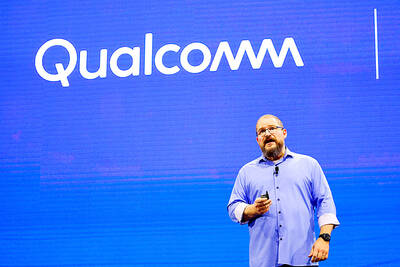Taiwan Financial Holdings Co (台灣金控), the nation's largest financial group, must cut its stake in Hua Nan Financial Holdings Co (華南金控) to below 25 percent within three years and consider selling the rest, the industry regulator said.
"We also ask Taiwan Financial to evaluate selling the remaining stake in Hua Nan, though no timetable is given for this part," Financial Supervisory Commission Vice Chairwoman Susan Chang (張秀蓮) said in a phone interview yesterday.
Except for the purpose of mergers, a financial holding company can't invest in other financial holding companies, Chang said.
Shin Kong Financial Holding Co (新光金控), which owns 7.9 percent of Hua Nan, may buy the stake, the Chinese-language Economic Daily News reported yesterday, without citing anyone.
"We'll do an evaluation on this if the government really wants to sell the stake," Shin Kong executive vice president Victor Hsu (許澎) said in a phone interview yesterday.
He said Shin Kong has some holdings in Hua Nan, although he could not immediately confirm the exact stake.
Taiwan Financial Holdings officially began operating yesterday and has under its umbrella the state-run Land Bank of Taiwan (
It will have assets of NT$5.12 trillion (US$157 billion), becoming Taiwan's largest financial group by assets.

Intel Corp yesterday reinforced its determination to strengthen its partnerships with Taiwan’s ecosystem partners including original-electronic-manufacturing (OEM) companies such as Hon Hai Precision Industry Co (鴻海精密) and chipmaker United Microelectronics Corp (UMC, 聯電). “Tonight marks a new beginning. We renew our new partnership with Taiwan ecosystem,” Intel new chief executive officer Tan Lip-bu (陳立武) said at a dinner with representatives from the company’s local partners, celebrating the 40th anniversary of the US chip giant’s presence in Taiwan. Tan took the reins at Intel six weeks ago aiming to reform the chipmaker and revive its past glory. This is the first time Tan

Qualcomm Inc is strengthening its partnerships with Taiwan Semiconductor Manufacturing Co (TSMC, 台積電) and original design manufacturers (ODMs) in Taiwan as it expands its presence in the artificial intelligence (AI) computer market, CEO Cristiano Amon said in Taipei yesterday ahead of the annual Computex trade show. “Historically we’ve always been a very big customer of TSMC, and we continue to be,” Amon said during a media Q&A session. “For chip manufacturing, we’re among the largest fabless [semiconductor designers],” he said, noting that Qualcomm, a leading provider of mobile and AI-enabled chipsets, ships about 40 billion components every year, with TSMC being

‘FAILED EXPORT CONTROLS’: Jensen Huang said that Washington should maximize the speed of AI diffusion, because not doing so would give competitors an advantage Nvidia Corp cofounder and chief executive officer Jensen Huang (黃仁勳) yesterday criticized the US government’s restrictions on exports of artificial intelligence (AI) chips to China, saying that the policy was a failure and would only spur China to accelerate AI development. The export controls gave China the spirit, motivation and government support to accelerate AI development, Huang told reporters at the Computex trade show in Taipei. The competition in China is already intense, given its strong software capabilities, extensive technology ecosystems and work efficiency, he said. “All in all, the export controls were a failure. The facts would suggest it,” he said. “The US

NEW PRODUCTS: MediaTek has been diversifying its product lines to minimize operational risks as mobile chips remain the company’s biggest revenue source MediaTek Inc (聯發科), the world’s biggest supplier of smartphone chips, yesterday said the tape-out process for its first 2-nanometer chip would take place in September, paving the way for volume production of its most advanced chip, likely to be its next-generation flagship smartphone chip, around the year-end at the earliest. MediaTek has been leveraging advanced process technologies from its foundry partner, Taiwan Semiconductor Manufacturing Co (TSMC, 台積電), to build its flagship mobile phone chips, a segment it once relinquished and then recovered four years ago as it released its Dimensity series. In the semiconductor industry, a tape-out refers to the